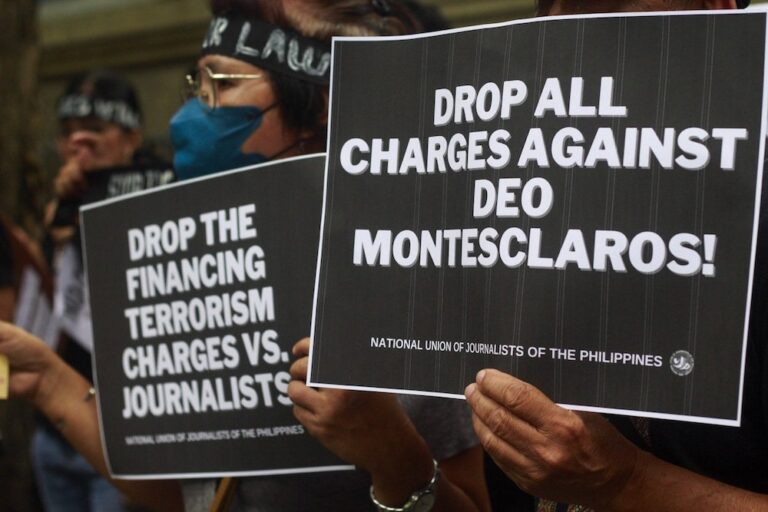(CPJ/IFEX) – CPJ is deeply disturbed by the threatening signals the Philippine administration has sent to the independent press in the Philippines in recent months as it pursued a 101 million peso (US$2.6 million) libel suit against the “Manila Times”, one of the country’s oldest newspapers. **Updates IFEX alert of 24 March 1999** The lawsuit […]
(CPJ/IFEX) – CPJ is deeply disturbed by the threatening signals the
Philippine administration has sent to the independent press in the
Philippines in recent months as it pursued a 101 million peso (US$2.6
million) libel suit against the “Manila Times”, one of the country’s
oldest
newspapers.
**Updates IFEX alert of 24 March 1999**
The lawsuit was filed on 9 March 1999, in response to an article
published
in the 16 February edition of the paper, which reported that, by
witnessing
a signing ceremony to close a deal between the government-run National
Power
Corporation and the Argentine engineering firm IMPSA Asia Ltd.,
Philippine
President Joseph Ejercito Estrada had become an “unwitting ninong
[godfather]” to the allegedly improper contract.
Although President Estrada announced that he would drop the legal
action on
8 April,
that decision came only after Times publisher Robina Gokongwei-Pe
issued a
front-page apology for the offending article, saying that it “was
never
intended to malign or impugn the sterling reputation (the President
has)
built up over several years of dedicated public service.” Gokongwei-Pe
is
the president of Metromedia Times Corporation, the Manila Times’
parent
company.
Four of the newspaper’s senior journalists -managing editor Chit
Estella,
associate editor Booma Cruz, chief reporter for news Eduardo Lingao,
and
chief business reporter Joel Gaborni, who wrote the controversial
story-
have resigned to express their concern that the newspaper’s
independence and
integrity were sacrificed by Metromedia’s attempt to appease the
government.
Journalists in the Philippines worry that the company was particularly
vulnerable to state pressure because the Gokongwei family’s business
empire
includes not only publishing interests, but holdings in closely
regulated
industries such as telecommunications and air transport. The family
was also
reportedly facing stepped-up pressure from government auditors
claiming the
Gokongweis owe 2 billion pesos (US$52 million) in back taxes.
CPJ is concerned by the President’s expressed determination to use the
Manila Times case to set an example that would, to quote from his
legal
complaint, “deter others in defaming, maligning, degrading, and
placing in
disrepute private individuals and public servants under the guise of
freedom
of speech.”
According to CPJ, this libel suit has indeed set a dangerous precedent
for
journalists who would attempt to explore sensitive issues such as the
awarding of government contracts. And while the President and his
supporters
argued that the “Manila Times” story might have discouraged foreign
investment, CPJ believes that government actions to block the free
flow of
information do far greater harm to investor confidence.
CPJ has recognized the Philippine press as one of the freest in Asia.
Recommended Action
Send appeals to the President:
and
refrain from reprisals against journalists performing their
professional
duties
Appeals To
His Excellency Joseph Ejercito Estrada
President of the Republic of the Philippines
Office of the President
Malacañang Palace
Manila, Philippines
Fax: +11 63 2 735 6152
Please copy appeals to the source if possible.


